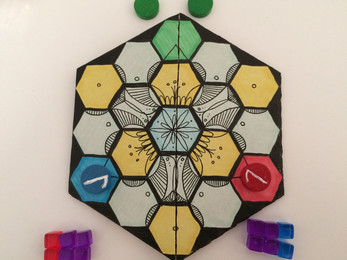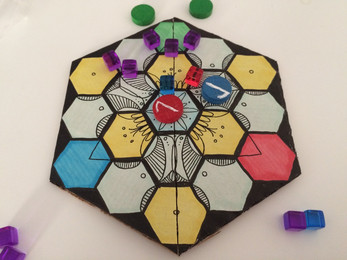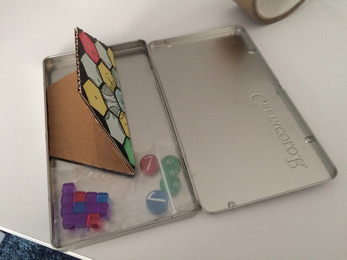Porti
A downloadable gateway
Download NowName your own price
Two travellers are stuck in the Halls of Walls! Luckily both travellers know the secrets of Gatemaking; this craft will surely be the key to their escape, but there's a snag – only one of them can ever leave the Halls...
This is a 2-player abstract boardgame about trying to place gates on the board to get to the goal before your opponent while also trying to trap them. The gameplay is indirect in a novel way and the rules are ultimately quite simple even if the rules PDF gets a bit wordy. The PDF explains the rules and provides illustrations for how to play and setup the game.
| Status | Released |
| Category | Physical game |
| Rating | Rated 5.0 out of 5 stars (1 total ratings) |
| Author | Hempuli |
| Tags | Abstract, Board Game, gate, wall |
Download
Download NowName your own price
Click download now to get access to the following files:
Porti_1_1.pdf 302 kB



Comments
Log in with itch.io to leave a comment.
Played this with a friend, was fun but came across some points where felt like we were missing something:
1. Who loses when both travelers move onto a space at the same time?
2. The game turned into avoiding moving onto the same space of another traveler. It was easier to force the opposing traveler to move onto your own traveler's space than try the win condition. We purposely avoided this to extend the game past ~8 turns, since the only way to avoid such a loss is the finite source of the two opposing color gates given at the beginning.
Perhaps changing that rule to "If a Traveller of the current player's turn moves so that both Travellers are on the same space, the game ends immediately, and the player whose Traveller moved onto the space loses.", or "travelers can't move through gates where the resulting space has another traveler" would be better.
Hmm, as the rules are currently there shouldn't be a situation where both the travelers move at the same time, since you place only one gate each turn and placing a gate that'd make a traveler move exactly 1 space isn't allowed. Could you describe what kind of a situation led you in a setup where both travelers were moving at the same time?
in two adjacent tiles: red gate, blue traveler, neutral gate between the two, red traveler, blue gate. The neutral gate gets placed last, causing both travelers to want to move thru their colored gates
we might've misunderstood something with how colored gates can be placed? (assumed that since opposing travelers can't move thru the opposite color gate it doesn't count as 1 space move)
Hmm, thinking about it, I think you're right and this just hadn't come up in testing. My intuition would be that technically the movement of either traveller stops after just one move when they're right next to each other like that, so placing a neutral gate in such a circumstance shouldn't be allowed; I'll need to adjust the rules to include this case. Thank you!
It did seem during testing that crashing-related victories were the norm and actually getting to the goal was more of a "this'll happen eventually if you don't act" -type timer for gameplay; it's not quite what I had in mind with the design but it did still lead to fairly interesting gameplay during testing so I thought it'd be ok for the nature of the game to be more crashing-oriented. Was the simultaneous crash issue the main problem when you were playing, or do you feel that even with the above adjustment the game would end in a similar situation too easily?
The simultaneous crash was rare, our games mainly ended when one of us ran out of moves to avoid a collision. Actually, that often occurred after one of us visited the green space, so perhaps length-wise it was ok
I want to confirm one thing. For the situation of the second photo on this web page. If red player take the next move and place a general gate on the up site of blue player's space, is that red player win the game because blue player would step into red player's space?(blue->up->left up->down->down)
Just want to make sure I read the rule right.
Sorry, I somehow missed this.
Yeah, that's the case! The blue piece would favour the downwards move at the green space due to the direction it evaluates gates in.
Oh that looks cool, I need to give it a spin
I don't know if I'll ever be able to find someone to play this with me, but I can still think about this.
1. Is a player able to reclaim gates they have placed down? Seems like a fascinating imbalance if so.
2. The facing disambiguation is interesting, but is there a way to prevent infinite loops? Literally speaking, the rules don't stop a token from moving back and forth between two cells forever, which is silly, so are tokens prevented from revisiting cells?
3. The "no single portalling" system is a bit weird on its own. Maybe it could be justified as going through a door on its own sends you into the next room too fast? Another things that could be tested is making the placement legal but actually traversing that door impossible. Dunno how well that would work, my mind is reeling.
One suggestion: Read the rule again, you misunderstand some. All three point is including in the pdf.
The third point isn't really a question at all, it's a hypothetical, and I doubt the first question is specifically addressed. That leaves the second question, which I could have missed, but that leaves me with another question: if it's so obvious, why didn't you just explain yourself?
Sorry I haven't directly answer the question. Because English is not my first language. So I'm afraid I read it wrong. And I also not good at explain it to other people.
Now you ask, I could provide my understanding. Maybe not correct, read it with the rule pdf.
1. Yes but not exactly right. Gates only reclaim by use. When the gate got use it go to their place. Color one return to the corresponding player with same color. Neutral gate return to share pool and moved player can reclaim to own 4 Neutral gate.
2. It won't be infinite loops. Because the gate use once then it will go out of the board, so player can't pass through it twice. So no loop.
3. The "no single portalling" is to prevent player to just use the gate to move one step again and again, because one step move reduces the strategy of the game. This game is not like most game to think about your next step. You need to think about multi steps and build the road to the target, and you can only place the last gate in front of you. And you also need to prevent other player used your road(because gate only used once, if other player use it, you lose your road). For example you use the red player, just want to make a two step move, you place the first gate, the blue player can use a blue gate to block your road. That is the strategy point. If allow one step move, player can use always move one step, other player make no strategy to prevent it.
Ohhh, because each gate gets removed as you travel through it, you can never travel through the same gate twice. Thanks!
I still think that gates automatically going to the player of the same color is weird. Could a player end up with too many neutral gates and not be able to pick up those gates? Is it impossible to pick up a gate of the opposite color?
This is a really nice abstract game, well done 👍🏼
Can you provide a second PDF for printing the illustrated game board that’s seen in the pictures? Or add it to the rules at the end I suppose. It seems to be hand drawn, but could probably be scanned?
Also, is there any significance to the yellow hex cells or are they just colored to look nice?
Thanks! I could scan the board, yeah; it's indeed hand-drawn. The yellow cells are just decorative, only the player starting cells and the "midway goal" green cell are meaningfully different from other cells.
What happened to the Elder Dance game?
The rules led to *very* stalemate-y games in a way I didn't realize, and I took it off Itch until I figure out a suitable rules adjustment. I'll put it back in once that happens :)
Oh ok
Persnickity wording question: "On their turn, each player may only place exactly 1 Gate." -- the rest of the rules lead me to believe that really, players *must* place exactly 1 Gate on their turn.
Other than that, this sounds very interesting. It seems as if the main win condition is the least likely to actually cause the game to end, but of course I haven't actually played it yet :)
Oh right, good point! The idea is that you must place one gate per turn. I'll adjust the wording